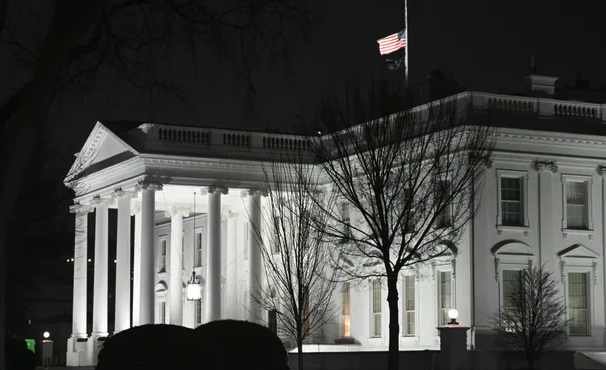
The White House flag at half-staff for 30 days to honor former President Jimmy Carte on his death at 100: NAJ screen shot
Editor’s Note: The sun is shining on the morning of Tuesday, Dec. 31, 2024, as we get ready to pass through the vortex of a new calendar year. In our never-ending cycle of life in the Milky Way galaxy, Earth is circling around the Sun and will reach the perihelion – or Earth’s closest pass of the Sun – on Jan. 4 this year.
Why does the New Year begin on January 1?
While doing the morning reading of emails and newspapers online, I stopped on former Washington Post media columnist Margaret Sullivan’s piece, since she and I seem to have some thoughts in common. She now publishes her column and podcast on Substack.
She points out one thing we have already reported, that former President Jimmy Carter remained alive long enough to not only reach the age of 100, but also long enough for him to vote for Kamala Harris for president. The timing of his death means that U.S. flags on every federal building, including the White House, the Capitol and the ranger offices at National Parks all over the country, will still by flying at half-staff on Jan. 20, when Trump is set to be sworn into office, again.
“I have a feeling he might approve,” Sullivan wrote of Carter.
Not since the deaths of former presidents Thomas Jefferson and John Adams on July 4, 1826, have we seen such propitious timing in our public life. Not that anyone watching Fox News will notice or even find out, but to astute observers who happen to tune in for the inauguration on another channel, some commentators may even point this out on Jan. 20. Even if it is just a wink and a nod trying to get people to think for a minute about the contrast between the decades of moral leadership shown in his life by Carter, and the total lack of character and overwhelming moral degradation of such a despicable fake actor as Donald Trump.
I doubt it will make much of a difference in these fucked up times we’re living through. But I don’t care. I’m going to write about it and point it out anyway. As I have said a thousand times at least, I did not sign up for the ass kissing business.
The other thing Sullivan pointed out in her quest to read literature or journalism that inspires her to do her best, she mentions E.B. White’s essay on Henry David Thoreau. After looking it up and reading it, what strikes me is that White’s commentary on the 100th anniversary of the publication of Walden came a decade or so before the environmental movement went mainstream, drawing on the inspiration of Thoreau as well more contemporary writers such as Rachel Carson.
Learning and thinking about such things is still what inspires me to think and write. Since I doubt few people here have ever seen this essay, we offer it up here today for your reading pleasure. Maybe a few people who happen to stumble upon this might like it enough to share it with their friends on social media. Or not. Quite frankly I am past the point of caring about chasing traffic by trying to cram knowledge down people’s throats on Facebook. There’s no money in it anyway. Social media is just not really helping anymore, if it ever did.
From the Essays of E. B. White –
In his journal for July 10-12, 1841, Thoreau wrote, “A slight sound at evening lifts me up by the ears, and makes life seem inexpressibly serene and grand. It may be in Uranus, or it may be in the shutter.” The book into which he later managed to pack both Uranus and the shutter was published in 1854, and now, a hundred years having gone by, Walden, its serenity and gradeur unimpaired, still lifts us by the ears, still translates for us that language we are in danger of forgetting, “which all things and events speak without metaphor, which alone is copious and standard.”
Walden is an oddity in American letters, it may very well be the oddest of out distinguished oddities. For many it is a good deal too odd, and for many it is a particular bore. I have not found it to be a well-liked book among my acquaitances, although usually spoken of with respect, and one literary critic for whom I have the highest regard can find no reason for anyone’s giving Walden a second thought. To admire the book is, in fact, something of an embarrassment, for the mass of men have an indistinct notion that its author was a sort of Nature Boy.
I think it is of some advantage to encounter the book in one’s life when the normal anxieties and enthusiasms and rebellions of youth closely resemble those of Thoreau in that spring of 1845 when he borrowed an ax, went out to the woods, and began to whack down some trees for timber. Received at such a juncture, the book is like an invitation to life’s dance, assuring the troubled recipient that no matter what befalls him in the way of success or failure he will always be welcome at the party—that the music is played for him, too, if he will but listen and move his feet. In effect, that is what the book is—an invitation, unengraved, and it stirs one as a young girl is stirred by her first big party bid. Many think it a sermon; many set it down as an attempt to rearrange society; some think it an exercise in nature-loving; some find it a rather imitating collection of inspirational puffballs by an eccentric show-off. I think it none of these. It still seems to me that best youth’s companion yet written by an American, for it carries a solemn warning against the loss of one’s valuables, if advances a good argument for a traveling light and trying new adventures, it rings with the power of positive adoration, it contains religious feeling without religious images, and it steadfastly refuses to record bad news.
Even its pantheistic note is so pure as to be noncorrupting—pure as the flute-note blown across the pond on those faraway summer nights. If our colleges and universities were alert, they would present a cheap pocket edition of the book to every senior upon graduating, along with his sheepskin, or instead of it. Even if some senior were to take it literally and start felling trees, there could be worse mishaps: the ax is older than the Dictaphone and it is just as well for a young man to see what kind of chips he leaves before listening to the sound of his own voice. And even if some were to get no farther than the table of contents, they would learn how to name eighteen chapters by the use of only thirty-nine words and would see how sweet the uses of brevity.
If Thoreau had merely left us an account of a man’s life in the woods or if he had simply retreated to the woods and there recorded his complaints about society, or even if he had contrived to include both records in one essay, Walden would probably not have lived a hundred years. As things turned out, Thoreau, very likely without knowing quite what he was up to, took man’s relaion to Nature and man’s dilemma in society and man’s capacity for elevating his spirit and he beat all these matters together, in a wild free interval of self-justification and delight, and produced an original omelette from which people can draw nourishment in a hungry day.
Walden is one of the first of the vitamin-enriched American dishes. If it were a little less good than it is, or even a little less queer, it would be an abominable book. Even as it is, it will continue to baffle and annoy the literial mind and all those who are unable to stomoch its caprices and imbibe its theme. Certainly the plodding economist will continue to have rough going if he hopes to emerge from the book with a clear system of economic thought. Thoreau’s assault on the Concord society of the mid-nineteenth century has the quality of a modern Western: he rides into the subject at top speed, shooting in all directions. Many of his shots ricochet and nick him on the rebound, and throughout the melee there is a horrendous cloud of inconsistencies and contradictions, and when the shooting dies down and the air clears, one is impressed chiefly by the courage of the rider and by how splendid it was that somebody should have ridden in there and raised all that ruckus.
When he went to the pond, Thoreau struck an attitude and did so deliberately, but his postruing was no to draw the attention of others to him but rather to draw his own attention more closely to himself. “I learned this at least by my experiment: that if one advances confidently in the direction of his dreams, and endeavors to live the life which he has imagined, he will meet with a success unexpected in common hours.” The sentence has the power to resuscitate the youth drowning in his eas of doubt. I recall my exhilaration upon reading it, many years ago, in a time of hesitation and despair. It restored me to health. And now in 1954 whe I salute Henry Thoreau on the hundredth birthday of his book, I am merely paying off an old score—or an installment on it.
In his journal for May 3-4, 1838—Boston to Portland—he wrote: “Midnight—head over the boat’s side—between sleeping and waking—with glimpes of one or more lights in the vicinity of Cape Ann. Bright moonlight—the effect heightened by seasickness.” The entry illuminates the man, as the moon the sea on that night in May. In Thoreau the natural scene was heightened, not depressed, by a disturbance of the stomach, and nausea met its match at last. There was a steadiness in at least one passenger if there was none in the boat. Such steadiness (which in some would be called intoxication) is at the heart of Walden—condifence, faith, the discipline of looking always at what is to be seen, undeviation gratitude for the life-everlasting that he found growing in his front yard. “there is nowhere recorded a simple and inexpressible satisfaction with the gift of life, any memorable praise of God.” He worked to correct that deficiency. Walden is his acknowledgement of the gift of life. It is the testament of a man in a high state of indignation because (if seemed to him) so few ears heard the uninterrupted poem of creation, the morning wind that forever blows. If the man sometimes wrote as though all his readers were male, unmarried, and well-connected, it is because he gave his testamony during the callow years. For that matter, he never really grew up. To reject the book because of the immaturity of the author and the bugs in the logic is to throw away a bottle of good wine because it contains bits of the cork.
……
On this its hundredth birthday, Thoreau’s Walden is pertinent and timely. In our uneasy season, when all men unconciously seek a retreat from a world that has got almost completely out of hand, his house in Concord woods is a haven. In our culture of gadgetry and the multiplicity of convenience, his cry, “Simplicity, simplicity, simplicity!” has the insistence of a fire alarm. In the brooding atmosphere of war and the gathering radioactive storm, the innocence and serenity of his summer afternoons are enough to burst the remembering heart, and one gazes back upon that pleasing interlude—its confidence, its purity, its deliberateness—with awe and wonder, as one would look upon the face of a child asleep.
……and the author of Walden has served as my conscience through the long stretches of my trivial days.
Hairshirt or no, he is a better companion than most, and I would not swap him for a soberer or more reasonable friend even if I could. I can reread his famous invitation with undiminished excitement.
The sad thing is that not more acceptances have been received, that so many decline for one reason or another, pleading some previous engagement or ill health. But the invitation stands. It will beckon as long as this remarkable book stays in print—which will be as long as there are August afternoons in the intervals of a gentle rainstorm, as long as there are ears to catch the faint sounds of the orchestra.
I find it agreeable to sit here this morning, in a house of correct proportions, and hear across a century of time his flute, his frogs, and his seductive summons to the wildest revels of them all.
Related: An Update on Thoreau’s Necessities of Life
___
Republished in the public interest as Fair Use.
___
If you support truth in reporting with no paywall, and fearless writing with no popup ads or sponsored content, consider making a contribution today with GoFundMe or Patreon or PayPal.













